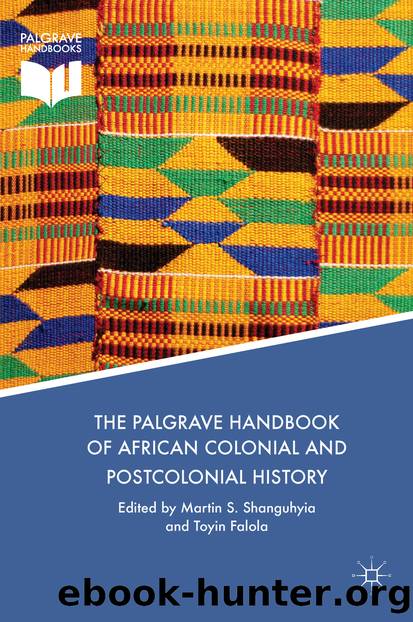The Palgrave Handbook of African Colonial and Postcolonial History by Martin S. Shanguhyia & Toyin Falola

Author:Martin S. Shanguhyia & Toyin Falola
Language: eng
Format: epub
Publisher: Palgrave Macmillan US, New York
The Cold War and Africa ’s Decolonization
The Second World War and its aftermath heralded a new vista in the global system. Besides its huge cost in human and material resources, the War led to the formation of new global alliances, altered existing relationships, created new superpowers , and demystified empires that had hitherto commanded respect, especially in the colonies . It was during the War that Africans finally realized that the European military wasn’t invincible. Africans who were drafted to fight in the war alongside their imperial masters saw, perhaps for the first time, that the European military which had conquered and colonized Africa could be vulnerable. Having participated in the War alongside the Europeans , Africans came back more emboldened to confront their European colonizers . As Crawford Young noted, the War created a ‘rupture in expectations’, as colonial subjects pressed for enhanced political and economic stature for Africans . 9 During the War , European colonists had been concerned that the US military forces that fought were a multiracial contingent which included African Americans , Asian Americans, Hispanics, Native Americans, and other ‘non-European Americans’. The concern of the European colonists was that dealing with the ‘black Americans would explode some of the racial stereotypes they had consciously cultivated in their colonies ’. 10 In effect, because the colonial policy directly denigrated Africans as being inferior to the white man, the colonists were concerned about how to relate with African Americans without contradicting the stereotype they had institutionalized in the African colonies . As Westad noted, this apparent contradiction came to a head when an adviser to the Belgian Government in the Congo , Felix de Muelenaere, tried to explain this contradiction to the African American diplomat Ralph Bunche in 1942. Felix de Muelenaere noted that black American soldiers ‘would have a bad effect on the Congo natives, especially on the detribalized native clerks … The Congo native would begin to think that he should have the same privileges as the highly developed American blacks who are college graduates, doctors, and professors’. 11
After first-hand experience of the devastation which Europe suffered, Africans began to question the toga of invincibility which was associated with the European military. The new realization that the colonial army was not infallible helped to strengthen the resolve of African freedom fighters to intensify the struggles for independence . In addition, the exposure of Africans from the colonies to black Americans during the War helped colonial subjects to begin to question some of the racial prejudices that the European colonists had consciously laid in the minds of Africans . Although the black Americans were still facing a series of racial challenges in the USA , at least the native African believed that the black American prospects were much better than those of Africans in the hands of the colonial masters . The first decade of the postwar period therefore witnessed intensified pressures for changes to colonial policies . However, the initial response of the French and
Download
This site does not store any files on its server. We only index and link to content provided by other sites. Please contact the content providers to delete copyright contents if any and email us, we'll remove relevant links or contents immediately.
| Arms Control | Diplomacy |
| Security | Trades & Tariffs |
| Treaties | African |
| Asian | Australian & Oceanian |
| Canadian | Caribbean & Latin American |
| European | Middle Eastern |
| Russian & Former Soviet Union |
The Secret History by Donna Tartt(16726)
The Social Justice Warrior Handbook by Lisa De Pasquale(11508)
Thirteen Reasons Why by Jay Asher(7835)
This Is How You Lose Her by Junot Diaz(5830)
Weapons of Math Destruction by Cathy O'Neil(5082)
Zero to One by Peter Thiel(4869)
The Myth of the Strong Leader by Archie Brown(4810)
Promise Me, Dad by Joe Biden(4481)
Beartown by Fredrik Backman(4466)
How Democracies Die by Steven Levitsky & Daniel Ziblatt(4450)
Stone's Rules by Roger Stone(4440)
The Fire Next Time by James Baldwin(4375)
100 Deadly Skills by Clint Emerson(4112)
A Higher Loyalty: Truth, Lies, and Leadership by James Comey(4061)
Rise and Kill First by Ronen Bergman(4049)
The David Icke Guide to the Global Conspiracy (and how to end it) by David Icke(3915)
The Farm by Tom Rob Smith(3896)
Secrecy World by Jake Bernstein(3811)
The Doomsday Machine by Daniel Ellsberg(3761)
